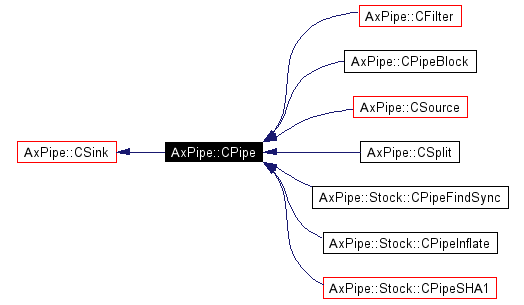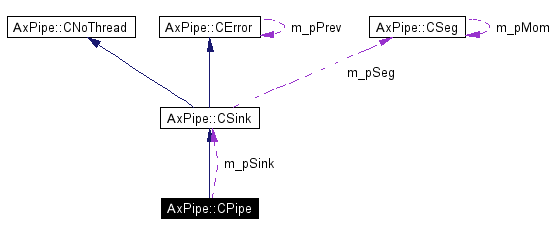
#include <AxPipe.h>
Inheritance diagram for AxPipe::CPipe:


Public Member Functions | |
| CPipe () | |
| Initialize member variables. | |
| ~CPipe () | |
| Destruct the sink as well, depending. | |
| CPipe * | Append (CSink *pSink) |
| Append a section by pointer with auto deletion. | |
| CPipe * | Append (CSink &sink) |
| Append a section by reference. | |
| void | Sync () |
| Ensure that all threads downstream are idle. | |
| void | Open () |
| Utility function, call to open the pipe downstream for output. | |
| void | Pump (CSeg *pSeg) |
| Utility function, call typically from Out(), to send a segment downstream. | |
| void | Flush () |
| Utility function, call to flush the pipe downstream. | |
| void | Close () |
| Utility function, call to close the pipe downstream for output. | |
Protected Member Functions | |
| void | Work () |
| Process one memory segment, possibly propagating. | |
| void | AppendSink (CSink *pSink, bool fAutoDelete) |
| Append a section by pointer. | |
| CSeg * | GetSeg (size_t cb) |
| Utility function, call if you think the next is a CSink that might give you an efficient segment. | |
| void | Signal (void *vId, void *p) |
| Out of band signalling downstream. | |
| longlong | OutSizeMax () |
| Overrideable, Calculate the maximum size of the CSink. | |
| CSeg * | OutGetSeg (size_t cb) |
| Overrideable, Allocate a writeable CSeg, possibly optimized for the CSink. | |
| bool | OutSignal (void *vId, void *p) |
| Overrideable, Receive an out of band signal from upstream. | |
| bool | OutOpen () |
| Overrideable, Open the data stream for processing. | |
| bool | OutClose () |
| Overrideable, Output any final data, close and prepare for new Open(). | |
| void | OutSpecial (CSeg *pSeg) |
| Overrideable, Process a special segment and send results downstream with Pump(). | |
| void | Out (CSeg *pSeg)=0 |
| Overrideable, Consume a segment and Pump() the processed result downstream. | |
Protected Attributes | |
| CSink * | m_pSink |
| Forward pointer to next section downstream. | |
Private Member Functions | |
| void | DestructSink () |
| The actual destructor code. | |
Friends | |
| class | CSplit |
| CSplit needs private access. | |
All non CSink objects are derived from CPipe, push and pull model processing segments as well as CSource.
The minimum derived class overrides Out() and processes the CSeg provided, using the utility member function Pump() to send processed data downstream.
Definition at line 269 of file AxPipe.h.
|
|
Initialize member variables. Do remember to only use default constructors in derived classes, and implement an Init() member if the class needs parameters for construction. The reason for this is the implementation of AxPipe::CThread as a template class. |
|
|
Append a section by reference. Append the next section by providing a reference to an instance. See the corresponding pointer version for details. Sections appended by reference are never auto-delete'd.
Reimplemented in AxPipe::CSource. Definition at line 112 of file CPipe.cpp. References AppendSink(). |
|
|
Append a section by pointer with auto deletion. Append the next section by providing a pointer to an instance. The chain of sections is scanned until it ends, and then the pointer to the segment is appended.
Reimplemented in AxPipe::CSource. Definition at line 102 of file CPipe.cpp. References AppendSink(). |
|
||||||||||||
|
Append a section by pointer. Append the next section of the pipe, by providing a pointer to an instance. Do not call this directly, use CSource::Append().
Reimplemented from AxPipe::CSink. Reimplemented in AxPipe::CSplit. Definition at line 88 of file CPipe.cpp. References AxPipe::CSink::AppendSink(), and m_pSink. Referenced by AxPipe::CSource::Append(), and Append(). |
|
|
The actual destructor code. Destruct the chain, waiting for parts of it to finish and skipping parts that should not be auto-destructed. It will call delete for those sections that are marked for auto-destruction. It is called by the base class destructor. If you need further clean up during destruction do that in a virtual destructor. Only override this if m_pSink does not point to a CSink derived section to also include in the chain of destruction. Reimplemented from AxPipe::CSink. Reimplemented in AxPipe::CSplit. Definition at line 45 of file CPipe.cpp. References _T, ASSCHK, AxPipe::CSink::DestructSink(), AxPipe::CNoThread::m_fExit, m_pSink, and AxPipe::CNoThread::WaitForIdle(). |
|
|
Overrideable, Consume a segment and Pump() the processed result downstream. The provided segment is guaranteed to be non-NULL and non-zero-length Special CSeg's with a non-zero eSegType value will be sent to OutSpecial() instead. Out() must be implemented in derived classes, there is no default. Pump() is the normal method for sending processed data.
Implements AxPipe::CSink. Implemented in AxPipe::CSplit, AxPipe::CSource, AxPipe::CFilter, AxPipe::Stock::CPipeFindSync, AxPipe::Stock::CPipeHMAC_SHA1< iBits >, AxPipe::Stock::CPipeInflate, and AxPipe::Stock::CPipeSHA1. |
|
|
Overrideable, Output any final data, close and prepare for new Open(). The code should handle multiple (extra) calls to an already closed stream with no ill effects, i.e. silently ignore them. This default implementation returns true to enable propagation by the framework.
Reimplemented from AxPipe::CSink. Reimplemented in AxPipe::CSplit, AxPipe::CFilter, AxPipe::CSourceMemFile, AxPipe::Stock::CPipeHMAC_SHA1< iBits >, AxPipe::Stock::CPipeInflate, and AxPipe::Stock::CPipeSHA1. |
|
|
Overrideable, Allocate a writeable CSeg, possibly optimized for the CSink. Normally not overridden in CPipe derived classes, as it's normally only a CSink that can provide an efficient alternative. This default implementation simply constructs a CSeg object of the required size.
Reimplemented from AxPipe::CSink. |
|
|
Overrideable, Open the data stream for processing. Override in user derived classes. Called by the framework as a result of an Open() call here or upstream. Prepare for processing of a new stream, it must support being called again after a Close() call. No data may be processed by the stream without an Open() call. The default implementation for a CPipe returns true, so as to have the framework propagate it downstream.
Reimplemented from AxPipe::CSink. Reimplemented in AxPipe::CSplit, AxPipe::CFilter, AxPipe::CSourceMemFile, AxPipe::Stock::CPipeHMAC_SHA1< iBits >, AxPipe::Stock::CPipeInflate, and AxPipe::Stock::CPipeSHA1. |
|
||||||||||||
|
Overrideable, Receive an out of band signal from upstream. Override in user derived classes to receive a signal sent from upstream. This will be called synchronized with the data stream, so previously sent data will have reached this section, unless some intermediate section buffers. No automatic Flush() request is sent though by the framework. The CPipe default implementation does nothing but returns true to propagate it downstream.
Reimplemented from AxPipe::CSink. |
|
|
Overrideable, Calculate the maximum size of the CSink. Normally this is not overridden in CPipe derived classes, as it's only the CSink that can do the job. This default implementation passes the call downstream to the final CSink, and then returns the result.
Reimplemented from AxPipe::CSink. Definition at line 194 of file CPipe.cpp. References AxPipe::longlong, m_pSink, and AxPipe::CSink::OutSizeMax(). |
|
|
Overrideable, Process a special segment and send results downstream with Pump(). Segments may be marked as special with a non-zero value based on AxPipe::eSegType types. This are filtered out of the stream by the framework and presented here instead of to Out(). Use this in derived classes to provide in band signalling and for other custom needs. Start numbering special segments with AxPipe::eSegTypeDerived. These segements may be zero-length.
Reimplemented from AxPipe::CSink. Reimplemented in AxPipe::CSplit. Definition at line 252 of file CPipe.cpp. References Pump(). |
|
|
Utility function, call typically from Out(), to send a segment downstream.
Definition at line 136 of file CPipe.cpp. References m_pSink, AxPipe::CSink::OutPump(), and AxPipe::CSeg::Release(). Referenced by AxPipe::Stock::CPipeSHA1::Out(), AxPipe::Stock::CPipeInflate::Out(), AxPipe::Stock::CPipeHMAC_SHA1< iBits >::Out(), and OutSpecial(). |
|
||||||||||||
|
Out of band signalling downstream. Callable from user code in derived classes. Called from derived classes processing code, to send an out of band signal with an opaque pointer value as the single argument downstream. This is useful when interpreted data upstream should affect the actions downstream - an example might be parsing an archive and then sending a file name downstream to a AxPipe::CSinkMemFile derived class that supports reception of the name and then opening a file under that name.
Reimplemented from AxPipe::CSink. Definition at line 178 of file CPipe.cpp. References m_pSink, AxPipe::CSink::OutSignal(), AxPipe::CSink::Signal(), and AxPipe::CNoThread::WaitForIdle(). |
|
|
Ensure that all threads downstream are idle. Synchronize all work downstream, ensuring that there is no work in progress. Reimplemented from AxPipe::CSink. Reimplemented in AxPipe::CSplit. Definition at line 120 of file CPipe.cpp. References m_pSink, AxPipe::CSink::Sync(), and AxPipe::CNoThread::WaitForIdle(). Referenced by AxPipe::CSplit::Sync(). |
|
|
Process one memory segment, possibly propagating. Called with m_pSeg set to whatever needs to be processed, and will call the appropriate Out function (Out(), OutOpen(), OutClose(), OutFlush() or OutSpecial()) and will also handle Plug() requests by exiting. Guarantees to only call Out() with valid, non-zero-length memory segments. Reimplemented from AxPipe::CSink. Reimplemented in AxPipe::CFilter. Definition at line 65 of file CPipe.cpp. References AxPipe::CSeg::AddRef(), AxPipe::CSink::DoSegWork(), m_pSink, AxPipe::CSink::OutPump(), AxPipe::CSeg::Release(), and AxPipe::CNoThread::WorkExitWait(). |
 1.3.5
1.3.5